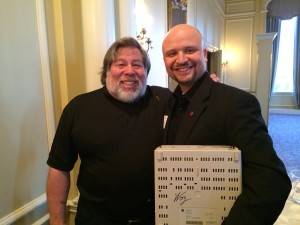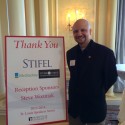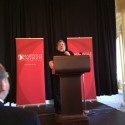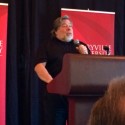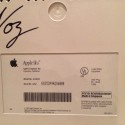Thoughts on Technology
The Facebook Messenger App is NOT the Devil!
I originally posted this article to my Life, Liberty, and Technology blog, but I thought the information was important enough to repost here as well.
Unless you’ve been living under a rock, you are well aware of all the dire warnings about Facebook’s “new” Messenger app floating around the Internet. At first I wasn’t going to write anything about it, but it seems that the story continues to get bigger. So I feel it necessary to discuss the warnings and how it all got started.
An article written by Nick Russo for a Houston radio station claimed that the Facebook Messenger app would have permissions to do all sorts of privacy-invading things if you installed it. For some reason, the article went viral. Well, it probably went viral for the same reason people send chain letters about virus hoaxes. It had just enough sensationalism mixed in with an authoritative tone to seem credible. The name of Nick’s radio station is “The Bull,” and perhaps that should have been an indication to people reading it that his article was for the most part, BS.
I’m not sure why this radio personality felt it necessary to pretend to be a technology expert. The very first time I read the article I knew there was something just not right. I tried to research his claims for some friends who were asking and for the life of me I couldn’t find anything about this guy stating that he had any professional experience besides working in radio. There’s nothing wrong with working in radio, but if you’re going to use your platform to disseminate information, please be sure you know what you’re talking about! As far as I’ve seen, Nick has not yet written an apology for his fear-mongering article, but rather has shifted into portraying himself as some sort of privacy advocate. Once again, I’m all for privacy advocates, but if you’re going to advocate – know of what you speak beyond just a cursory scratching of the surface.
Nick Russo made a lot of outlandish claims regarding what the Facebook Messenger app could do. The first problem with his claims were that he didn’t make a distinction between smartphones. I knew right away when reading his article was that there was no way Apple would allow an app like that to get into their App Store. Certainly it might be possible with an Android-based phone, however unlikely it would be, but Apple puts every single app submitted to their store through an approval process. Every. Single. App. Yeah, there’s no chance that Apple would allow Facebook Messenger, or any other app, to do the following as claimed by Nick Russo:
- change or alter your connection to the Internet or cell service … for its own reasons without telling you.
- send text messages to your contacts on your behalf … when they want
- see through your lens on your phone whenever they want .. listen to what you’re saying via your microphone if they choose to
- read your phone’s call log, including info about incoming and outgoing calls … Facebook will know all of this
- read e-mails you’ve sent and take information from them to use for their own gain.
- read personal profile information stored on your device … addresses, personal info, pictures or anything else
- Facebook will now have a tally of all the apps you use, how often you use them and what information you keep or exchange on those apps.
It’s not like Apple iPhones are some off-the-wall brand that can be safely overlooked when discussing smartphones. They are just a *little* popular, to put it lightly. So to write an article like this with such extreme claims and not know about Apple’s approval process is simply irresponsible. But even if we were to ignore iPhones for the moment, does anyone really think that Facebook would want to do most of what is claimed above to their users? Perhaps Mr. Russo should have put in a call to someone at Facebook to ask a few questions first? Or at least do a tiny little bit of research on this thing called the Internet before publishing an article like this? I bet even the resident PC guy at “The Bull” probably could have warned Nick that his claims were pretty far out and to be careful before publishing his article. But alas, Mr. Russo took a little sliver of knowledge and believed he knew more than he did – running off like “The Bull” in a china shop and starting a viral tidal wave in the process.
To be fair, in theory – extreme theory, what Nick Russo claims above could possibly be accomplished by highly malicious apps running on some smartphone platforms. But Facebook Messenger isn’t a malicious app. And Nick must have found that out because in his next article he states, “I’ve now learned that both the New Facebook Messenger App and the original Facebook app have many of the SAME permissions.” Yes, I’m sure he did learn a few things once his article went viral! But perhaps those things should have been learned BEFORE publishing! As it turns out, the Facebook Messenger app (which isn’t new, but has been out for years), does virtually nothing different than any other similar app, including the normal Facebook app that billions of people already use. Oops!
Apparently once he found that out, Nick choose to portray himself as a privacy advocate, championing the idea that he made people more aware of the privacy choices on their phones. Fair enough, but let’s call a spade a spade. If he really cared about people’s privacy choices, he would have done some research and consulted with technology experts so that he could have written a balanced article. Any good that he has done has been completely obscured by the hysteria he created. Advocacy by accident at best. Fear-mongering at worst.
Bottom line, there are many articles that debunk Nick’s claims. Here is another article discussing some of Nick’s claims as “myths”. Facebook even posted an article discussing the privacy concerns. So the moral of the story is that we can’t believe everything we read – especially when it comes to technology topics. While we may not like the fact that Facebook is making everyone use a separate app for Messenger, spreading misinformation isn’t helping anybody.
Meeting Steve Wozniak
Back on January 28th, I was lucky enough to personally meet Steve Wozniak, a living legend in the technology industry. First a shout out to Cathy and Jack Davis of Davis Creative for giving me the heads up that Steve Wozniak was holding a special reception while he was in town to give a speech. I would have likely not known otherwise and missed out on the opportunity. For those of you that may not be aware, Steve Wozniak was co-founder of Apple Computer, along with Steve Jobs, and was the primary designer of the Apple I and Apple II computers that ignited the personal computer revolution. The first real computer I ever used was an Apple IIe and I spent most of my early years learning computer technology on various Apple II series computers. So to say that Steve Wozniak was influential in my life is an understatement. Meeting such an important person in the history of the technology industry was an absolutely incredible experience.
Wozniak primarily gave a little talk, answered some questions, and then shook hands with people and signed autographs. I even managed to get him to sign my old Apple IIgs computer!
Here are some highlights of what he spoke about that evening.
- He mentioned several times about how he never really was interested in starting or running a business. He just wanted to create great technology.
- Along the same lines, he was clear that Steve Jobs was not the technology brains behind Apple. But he was also clear that without Jobs’ contributions, Apple would have never existed as a business. He said that the two of them together were a perfect combination.
- He talked about the relative failure of the educational system to take advantage of technology for teaching. He cited that most class sizes are too big and most educational systems don’t allow for outside of the box thinking. Technology should be giving kids the ability to think for themselves, but most educational systems stifle that creativity and therefore technology is not being used to its fullest potential. (Personally, I’ve seen the contrast between school districts that embrace technology and those that don’t, so I got exactly what he was saying. Too much old-school thinking that technology is just “fun and games” still permeates some educations systems and they try too hard to control the way technology is deployed in the classroom. In the meanwhile, kids are using technology in all other aspects of their lives so they look at the classroom as archaic and this stifles their learning. Other districts embrace personal technology and have made great strides in teacher-student interaction and subsequently the kids are learning in ways they are very comfortable with. Some of you know all too well exactly what I’m talking about.)
- He received a question along the lines of what tips and tricks did he use to create the first Apple computers. Wozniak’s reply was, “I was inventing the tips and tricks”. If you know the history of the early personal computers like I do, you’d understand that he was right. Wozniak was using existing technology and making it do things it wasn’t exactly intended to do. But by doing so, he was able to solve technology problems in a way that allowed for the early personal computers to be relatively simple, and more importantly, affordable. The contributions of Steve Wozniak to the personal computer revolution can not be overstated.
- Wozniak said that to him creating computers was the easy part. The business stuff was hard and he was so grateful that Steve Jobs handled all that stuff.
As a technology professional and a technology enthusiast, meeting one of the men who ignited the personal computer revolution was an experience of a lifetime. Below I share a few pictures and video of the event. I hope you enjoy them!
- A picture of the Steve Wozniak reception poster.
- I’m about to meet Steve Wozniak. Can you tell I’m excited?
- Here’s my Apple IIgs that I wanted Steve Wozniak to sign. It was quite the hit among the techies in attendance!
- This was my view of Steve Wozniak speaking
- Another view of Wozniak speaking
- The Woz just signed my Apple IIgs!
- Here’s my Apple IIgs after it was signed by Steve Wozniak
- Here’s a closeup of my Apple IIgs signed by Steve Wozniak
Steve Jobs, Aspen, a Lost Time Capsule, and Me
As we get closer to the season premiere of the National Geographic Channel’s show, Diggers, where I will make my national TV debut, I have been inundated with questions on how all this came to be. The story is quite detailed, but for those of you who are wondering, I will give you a summary here. First, here is the sneak peek of the upcoming Diggers episode set to air tomorrow February 25th at 9 PM. I am featured toward the end of the clip.
In 2011, my client John Celuch gave me a cassette tape of a Steve Jobs speech he attended in Aspen, Colorado back in 1983. Steve Jobs delivered this speech as part of a yearly design conference that John had attended for several years. Once I finally got around to listening to the speech and realizing that virtually no copies of this speech were available on the Internet, I digitized the speech and posted an article about it on one of my blogs in October 2012. The article went viral and received a lot of attention. The speech is pretty amazing and you can read the article I wrote about The “Lost” Steve Jobs Speech of 1983 by clicking here.
While I was preparing to post my article about the speech, John Celuch told me a story about the design conference in 1983. That year the theme of the conference was about the future. In keeping with the theme, Steve Jobs was there to talk about the personal computer revolution and the conference organizers also wanted to bury a time capsule. After John heard Steve Jobs’ speech, he personally asked Jobs if he wanted to donate something to the time capsule. Jobs gave him the mouse from the Lisa computer he used during the speech. The time capsule (technically a 13-foot long PVC “tube”) was buried in Aspen with the intention of digging it up in the year 2000. However, by the year 2000 the conference had faded away so no one was really in charge of recovering the time tube. In addition, the records detailing the exact location of the time capsule were missing. No real effort was made to recover the time tube so it remained buried and lost. I wrote an article about the “Lost” Aspen Time Tube as a follow up to the Steve Jobs speech, which you can read by clicking here.
The article about the Aspen Time Tube received some attention, but not nearly as much as the article about the “Lost” Steve Jobs speech. I wrote in the article that I would have loved to see the time capsule, along with Steve Jobs’ mouse, recovered in the year 2013, exactly 30 years after it was buried. Nothing much transpired for several months but luckily the article caught the attention of the producers of the show Diggers in early 2013. They were interested in recovering the time tube for an episode of their show. After being contacted by the show’s producers, I gave them the information I had and put them in touch with John Celuch. I didn’t hear much else for a few more months but eventually John let me know that the show was on track to film in September and we were invited to participate in the recovery of the time tube. So in September of last year John and I took a trip to Aspen and we helped recover the lost time tube.
I can’t give too many details of the show until it airs, so watch the episode of Diggers when it airs February 25 at 9 PM Central Time on the National Geographic Channel. After the show airs I will be able to reveal my own personal photos and video I took during the filming and fill in my own experiences.
The Magic of Technology
Any sufficiently advanced technology is indistinguishable from magic.
– Arthur C. Clarke
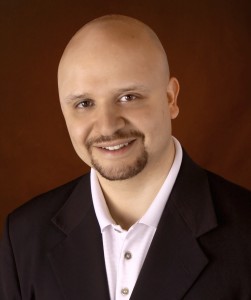
The biggest reason for this has been the acceptance of personal technology by society at large. Prior to The New World of Technology, the computer and technology industry was like an old boys’ club. Only those who were privileged enough to have learned a lot of arcane knowledge could make the most of the technology available to them. Average people used computers to be sure, but by-and-large it was a love-hate relationship (with a lot more hate usually). Technology products were created by technology people for other technology people. The focus was on specifications such as gigahertz and megapixels, power and performance. The technology industry was controlled primarily by people who worked in big companies and organizations.
Then in the 2000’s things changed. Some technology companies began creating products that put the attention on the user experience – and the world beat down a path to their door. However, not all technologies companies have figured this out. It’s easy to see by the commercials that companies produce where their priorities are. Most technology commercials still spend all their time talking about hardware specifications and how powerful their products are. Or worse, the commercials feature snarky or smug actors who portray techie know-it-alls attempting to ridicule people who don’t keep up with the latest technology buzzwords. So it was refreshing to see a technology commercial that stands in stark contrast to all the others.

The first time I saw this commercial, I knew it was powerful. I rewound the commercial and made my wife watch it. At first she thought the same thing I did. What’s this kid’s problem? Why is he on his phone all the time? But when the video started playing, my wife’s reaction was just like the family members in the commercial. Waterworks. My wife is technology literate, but she isn’t a geek like me. Like most people, she generally tunes out on technology commercials. Yet she felt the energy of this particular technology commercial – not because of the technical specifications of the device (or even the device itself) – but because of what the technology empowered the awkward teenager to express.
Just like the holiday season, good technology is magical. It’s hard to put into words sometimes what makes one tech product better than another. Ultimately you just know it when you use it. As we all get some time to reflect back on this year and what we want to accomplish in the next, I would encourage everyone to think about how their current technology impacts their lives. The power is now in your hands, not the IT guy at work or the geek at the electronics store. The magic is there if you want it – you just need to know where to look for it.
The Legacy of Steve Jobs
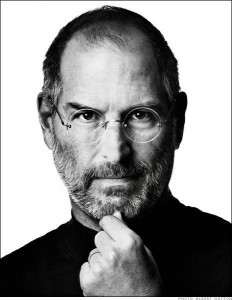
“I want to put a ding in the universe.” – Steve Jobs
Having the reputation of the area’s longtime Apple expert, it was not surprising that I received so many questions what I thought about Steve Jobs and what it meant now that he has passed on. I put off writing this article because I wanted enough time to contemplate – but also because I was honestly not prepared to let go.
No single man has had the impact on the technology world that Steve Jobs has had, at least since the introduction of the personal computer. Nearly every technology that you and I use today – from the mouse, to the PC, to the way we listen to music today, even the phones we use – has the mark of Steve Jobs. No, he didn’t invent most of the technologies that we use. But he either brought them to market first, or figured out how “the rest of us” could best make use of those technologies. Did you know the world wide web was invented on a computer that a Steve Jobs company designed? Without Steve Jobs, even the Internet as we know it today may not exist. Given how ingrained technology is in our world, it is easy to say that no single man has had the impact on our very lives that Steve Jobs has had.
As for myself, my introduction to computers was on an Apple IIe. Apple was widely used in education during the 80’s, and I learned on Apple computers for much of my early life. Since then, my life and career has somehow been intertwined and influenced by Apple and other technology creations by Steve Jobs (NeXT, Pixar). The more I learned and experienced all sorts of different technologies, the more I realized that Apple products were different and special. Apple products have always been known for their ease of use and the fact that they make technology accessible to everyday people. Making technology easier to use and accessible to my clients became the mission of my technology business. It is no stretch to say that Steve Jobs has been the biggest influence in my career.
It can be said that we lost Steve Jobs too soon. But I think that one of the reasons Steve Jobs had such success resurrecting Apple was because he knew that his time in this world was short. Knowing that he only had limited time to perfect and implement his vision of technology in our world, he became super-focused on making this happen. Perhaps we wouldn’t have the Apple products that were introduced in the last 5 or so years without this intense focus. Steve Jobs didn’t waver from his mission and he has now shown much of the world how technology should be – not the tangled mess most of us were familiar with in the 90’s and early 2000’s.
It is incredible what an outpouring of grief and gratitude the world showed when Steve Jobs died. It is clear that he did impact the world in a way that even I didn’t fully grasp. But now that he’s gone, it is up to rest of us to continue his mission. We must continue to push for the best technology possible. We can not allow technology companies to settle for mediocracy. We must continue to make the investment in ourselves to seek out the technology that best fits our lives. We can not allow ourselves to simply accept the technology that so-called experts say is the best for us. Above all, we must understand that technology is much too important to take for granted. If we all commit to take the reins that Steve Jobs has left behind, nothing will be impossible.
Your iPhone is Safe
One of our local TV stations ran a segment tonight warning their viewers about potential security risks with smartphones. They basically identified two risks: malicious apps and phishing texts. I have no issue with their warnings about suspicious text messages, and I hope that most people are savvy enough to recognize junk texts as illegitimate (would you really give away your social security number to a random text?). But I have a serious issue with their portrayal of malicious apps.
Simply put, they only speak vaguely about “phones”, “smartphones”, and once mention “tablet”. Yet every device they showed was an Apple iPhone or iPad. And there is the rub. Apple iOS devices (iPhone, iPad, iPod Touch) can NOT get malicious apps. Let me say that again so there is no doubt: Apple iOS devices can NOT get malicious apps. (A few of you out there may argue that jailbroken iOS devices can get malicious apps, but if you are the type to jailbreak your device, then you know well enough what you are potentially getting yourself into.)
This is one of the main advantages of the tight control Apple retains over their App Store. The Apple App store is the only way of installing apps on iOS devices. Every single app must be specifically reviewed and approved by Apple before it is allowed to be made available to the public. By controlling the only method of installing apps on iOS devices, Apple ensures no malicious software can make its way into the iOS “ecosystem”. Other smartphone platforms, namely Android, do not offer any control over the apps that their devices can download. Consequently, there are already many examples of malware for those platforms. Some technical people argue against Apple’s system, claiming that it isn’t “open” or that it restricts the freedom of software developers. But I guarantee you that owners of iOS devices could care less about “openness” or the freedom of developers – so long as there are plenty of useful and malware-free apps available. 200 million iOS devices sold (as of June 2011) seem to back up Apple’s way of doing things.
So while the news segment never specifically mentions the iPhone or iPad, by ONLY showing video of iOS devices, even going so far as to show the Apple App Store, the clear insinuation is that Apple iOS devices are as susceptible to malware as any other platform. As I have explained, this is blatantly WRONG. While I do not believe this news segment was meant to be deliberately misleading, it is unfortunately spreading misinformation.
To be fair, if you own any smartphone besides an Apple iPhone, you should pay heed to this news segment’s warnings. I would also give the same advice to those that own any tablet besides an iPad, but Apple’s complete and utter domination of this market means that likely not a single person reading this article actually owns a tablet that isn’t an iPad. (There is no “tablet” market, there is only an iPad market)
Bottom line, if you own an Apple iPhone, iPad, or iPod Touch, you have nothing to worry about as long as Apple retains control over their App Store – which there is NO sign of that changing any time soon.
Macworld 2009 Keynote Analysis
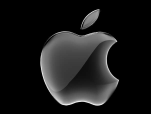
As many people expected, Apple didn’t have any earth shattering announcements at this year’s Macworld keynote. Of course, it’s not every year a company can come out with a product like an iPhone or a MacBook Air. Certainly, the atmosphere after this year’s keynote announcements is much more subdued than last year’s. But overall, I think today’s announcements shows Apple’s strengths and how they will continue to lead the industry in innovation, even when introducing what at first may seem rather mundane.
For example, the technology behind the Faces feature in the new iPhoto 09 seems straight out of hollywood. The software literally can recognize people’s faces so that users can organize their photos by who is in the picture. All of a sudden, the landscape of photo organization software has changed. No other software has this technology with such a user-friendly implementation. Similarly, with the Places feature, Apple has now taken the Geotagging phenomenon and brought it to the masses. The technology is very simple, but Geotagged photos can now be organized in many and varied ways. Combined, the Faces and Places features allow users to more easily organize and create photo slideshows, books, and create other photo projects that they may not have been able to before.
This theme of empowering users has been the hallmark of Apple technology since day 1. But it seems that in the last few years Apple’s accomplishments have really started to take off at a rate unprecedented. A lot of it has to do with the digital media revolution. Most of the digital media technologies were not invented by Apple, but Apple has led the way in allowing users to make the most of it. Where would we be today if Apple had not invented the iPod? Would there be such a large market of people using portable digital music players? Most likely not, as no other company has come out with a device as compelling as the iPod or a music service as compelling as iTunes. What Apple has done for digital music, they are trying to do with digital photos and videos.
Apple’s “Learn to Play” feature in Garage Band is one of the most innovative new technology features, not just from a technology standpoint, but from a business standpoint as well. What other company could come up with an entirely new revenue source such as this? People, especially young people, will be buying up training sessions by popular recording artists and interactively learning to play instruments. Not only will this feature make them direct, recurring revenue by selling the training, but this feature alone may cause another spike in Macintosh sales. Nothing like this exists on any other computer platform and will not likely for some time.
iWork 09 seems to be a good upgrade. Nothing earth-shattering, but Apple quietly continues to improve their productivity software. However, the Keynote Remote app allows integration of presentation software and a handheld computer like never before. Powerpoint is quickly becoming the tool of yesterday.
iWork.com has to potential to change the way people share documents forever. Why e-mail when you can share and collaborate on documents on a web site?
The Mac Box Set will probably sell like hotcakes to users who have Macs that are older than a year. For the price, it is almost silly NOT to buy it as compared to any of the 3 individual products.
The new MacBook Pro 17″ really shows Apple’s prowess in designing things that are simply technological marvels. In one fell swoop, Apple improved working battery life, improved the lifespan of a battery, and is helping the environment just by redesigning the way they implement batteries in a laptop. It took a lot of out of the box thinking and some risks, but in the end, it will probably change the way all laptop manufacturers create batteries.
And finally, the announcement that iTunes is going DRM-free is yet another example of how much power Apple has, not just in the computer industry, but in media as well. A few years ago, there would have been no way in hell that the record companies would have allowed a DRM-free music store to exist (DRM is a general term for technology that restricts the way digital media can be copied). But Apple’s success with iTunes has showed record companies that users ARE willing to pay for music on-line when presented with an easy and inexpensive method of doing so. Now by removing DRM, this process will become even easier.
So that’s it for day 1 of Macworld 2009. I will write further posts over the next couple of days summing up interesting things I may see.
Macworld 2009 Live
Click Here to read my live Facebook blog.
Macworld 2008 Photos
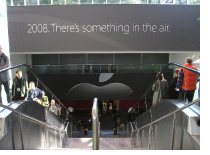
Live from Macworld: Day 3

Thanks to Accura for providing their “Accura Lounge”. By far, this lounge area had the fastest, most stable Internet connection in the entire expo. This connection allowed me to do several things, such as having video conferences with my wife and daughters at bedtime.
Thanks to Eric Rasmussen of Central Computers. Yesterday I went into Central Computers to buy a cable, and even though the store was somewhat busy, we was friendly and answered a few questions I had regarding what items were hot sellers. He also showed me an interesting new item, the Asus Eee PC, which I will share more of later. He then informed me of a party for Mac software developers that would take place next door to the computer store. Not having any plans last night, I made it a point to check out the party. At this party, I met several interesting people.
One of these interesting people was Mark Peason of Plasq. Plasq is small software development company with many of its employees from Australia. Mark is from Australia and we had an interesting conversation about American accents and the new Apple products, among other things. One fun thing about conferences like this is meeting people from all over the world that share many of the same interests as you.
Another interesting Australian from Plasq I talked to was Rachel Prins. We had an interesting talk about the Apple II and Commodore 64, as well as her own business. If you are a fan of the 80’s cartoon and doll line, Jem, check out her site, www.jemgirl.com. She offers a doll customizing service and many of her clients are from the United States.
Tomorrow is the last day of the Macworld expo. I’ll keep my eyes and ears open for anything further to report.


